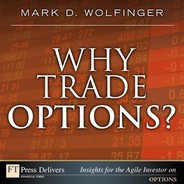Why Trade Options?
Mark D. Wolfinger
For many people, investing involves buying individual stocks or mutual funds. More sophisticated investors may adopt the risk-reducing strategy of diversifying their assets. These people would own gold and other commodities in addition to stocks. They may also have holdings in bonds, real estate, and stocks that are not traded on the exchanges of their native country.
Not knowing how to begin the process of investing in the stock market, a great number of investors seek advice. They may follow the ideas suggested by financial journalists—print, Internet, and talking heads on television. Some depend on their stockbrokers for recommendations on which stocks to buy and sell. Sadly, stockbrokers are nothing more than salespeople who may have some market experience, but if they knew which stocks to buy or sell, they would be too wealthy to peddle stocks to others.
Many investors are content to pay others to manage their money. That’s how the mutual fund industry has become so rich and powerful. Hedge funds charge enormous fees (20% of all profits plus 2% as a general fee). However, that has not prevented eligible investors from plowing cash into these funds.
Buying the advice of professionals seems to be the right thing to do. After all, don’t the pros know more than everyone else? Aren’t they more skilled? It’s easy to see that professional athletes are better than we are when it comes to golf, basketball, or any other sport. Shouldn’t investors expect the same outperformance from investing professionals?
Maybe they should expect it, but they don’t get it. Available data proves that highly paid mutual fund managers cannot outperform their benchmark indexes on a consistent basis. Sure, a few money managers perform well for several years, but then inexplicably their returns fall to well below average. There are shining stars (think Peter Lynch and Bill Miller), but how is any investor supposed to find them before they become stars? And if you discovered Bill Miller lately, that would have cost money because his bubble has burst.
At one time during the twentieth century, the simple plan of investing in mutual funds and ignoring the annual fees was all any investor needed. It may not have achieved maximum results, but when the markets rose, and the rising tide carried all boats, investors were almost always pleased with their results. For the passive investor who didn’t have to do anything more strenuous than write checks to add cash to their accounts, these returns were truly a godsend. Paying a mutual fund manager to make all decisions seemed to be a small price to pay. Of course, paying the fund manager’s fees year after year took a sizable chunk out of the investor’s account, but there were no reasonable alternatives for the unsophisticated individual investor.
Times have changed. Evidence shows that mutual fund managers cannot outperform the market on a consistent basis1 and that they charge too much for their services. Baer and Gensler conclude that paying for the active management of our investment money is wasted money. The fund managers fail to match the performance of index funds. The idea of owning index funds as a more efficient investment methodology (when compared with owning mutual funds) was popularized by John Bogle2 at Vanguard.
In recent years, many mutual fund investors understood the benefits of switching to index funds—or even to exchange traded funds (ETFs). However, even the supremely popular ETFs soon became investments whose performance was questioned. This is especially true for leveraged ETFs.3
